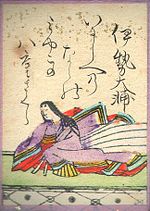Ise no Taifu

Ise no Taifu (伊勢大輔), also known as Ise no Tayū or Ise no Ōsuke, was a Japanese waka poet active in the later Heian period (early 11th century).[1][2]
She is one of the later Thirty-six Poetry Immortals, and one of her poems is included in the Ogura Hyakunin Isshu. Her contemporaries include Uma no Naishi, Murasaki Shikibu, and Sei Shōnagon. A diptych of her exists in Nihon Meijo Banashi (Stories of Famous Japanese Women), implying that although little of her work exists into modernity, she was considered a critically important figurehead of the waka poetry movement, both as a Poetry Immortal and as a woman of renown.
Her grandfather, Ōnakatomi no Yoshinobu, was also an important waka poet.
Her mother, Kura no Myobu, served Fujiwara no Yorimichi, the first son of the powerful Michinaga, so she could get a support and joined to the imperial court. She became friends with Murasaki Shikibu and Izumi Shikibu. She was talented in music, so she was very popular and noble lady-in-waiting who moreover, could write poems and songs.
Poetry
Only a few of no Taifu's poems have survived into modernity, translated in part due to Waka poetry anthologies:
| Japanese[3][4] | Rōmaji | English[3] |
|---|---|---|
散り積もる |
Chiritsumoru |
Scattered and drifted are |
One of her poems was included in the Ogura Hyakunin Isshu:
| Japanese | Rōmaji | English[5] |
|---|---|---|
いにしへの |
Inishie no |
The double cherry trees |
Below is another of her poems, translated in the Asia-Pacific Journal:
| Japanese | Rōmaji | English[6] |
|---|---|---|
おき明かし |
Oki akashi |
Peering hour after sleepless hour |
References
- ^ McAuley, Thomas E. (2019-11-19), "Winter I", The Poetry Contest in Six Hundred Rounds (2 vols), Brill, pp. 450–497, ISBN 978-90-04-41129-6, retrieved 2024-07-10
- ^ Huey, Robert N. (2002-11-15), "Finishing Touches, Ken'ei and Beyond (1206–1208)", The Making of Shinkokinshū, Harvard University Asia Center, pp. 333–380, ISBN 978-1-68417-365-5, retrieved 2024-07-10
- ^ a b "Ise no Taifu-shū 140 | Waka Poetry". www.wakapoetry.net. 25 July 2017. Retrieved 2018-10-22.
- ^ Cranston, Edwin A. (1993). A waka anthology. Translated by Cranston, Edwin A. Stanford, California. ISBN 0804719225. OCLC 25163677.
{{cite book}}: CS1 maint: location missing publisher (link) - ^ Motoori, Norinaga (2007). Michael F. Marra (ed.). The Poetics of Motoori Norinaga: A Hermeneutical Journey. University of Hawaii Press. p. 233. ISBN 978-0-8248-3078-6.
- ^ "Goshūi wakashū, poem 295 by Ise no Taifu". Retrieved 2018-10-22.
